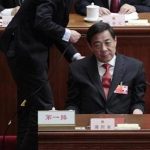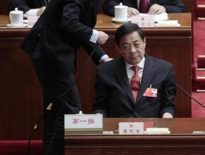(Reuters) – A lawsuit Peruvian President
Ollanta Humala successfully fought in courts before being elected has been filed to the main human rights body in the
Americas – potentially reopening a case that cost him politically in the past.

symbolic agreement which marks the use of natural gas from Block 88 for domestic use at the district of San Sebastian, in
Cuzco, April 3, 2012. REUTERS/Enrique Castro-Mendivil
Documents reviewed by Reuters show that lawyers for a relative of two people who were disappeared in
1992, when Humala was an army officer battling Maoist guerrillas, have sent a claim against the Peruvian state to the
Inter-American Commission on Human Rights.
The 21-page complaint, which mentions Humala nine times, was filed
confidentially in early 2010, a year before Humala shed his outsider image and reinvented himself as a business-friendly
leftist to win the presidency on his second try. Reuters was shown the claim by someone close to the case after relations
between the government and the commission soured in December over a separate case stemming from Peru’s 1980-2000 civil war,
which killed or disappeared 69,000 people.
The petition says Peru’s judiciary botched the original suit involving
Humala by dismissing it in 2009 for lack of evidence. The case hinged on whether Humala, who at the time of the
disappearances ran the army’s Madre Mia counterinsurgency base in a remote jungle, ordered or permitted soldiers to kidnap a
man and a woman, Benigno Sullca Castro and Natividad Avila Rivera, from a jungle town rife with Shining Path rebels. The two
were presumed to be collaborators. They were never seen again.
Though the complaint was lodged nearly two years ago,
news of the filing is sure to roil the political waters and further fracture the government’s relationship with the rights
panel, which Humala’s administration has accused of interfering in local affairs.
It will also exacerbate a political
dilemma Humala has faced since he took office in July: In a bid to govern as a centrist, he has alienated leftists in his
party who say he has drifted too far to the right. During his campaign, he promised groups on the left he would defend human
rights but has since strengthened ties to a military that leans right.
The Madre Mia suit was shelved by the Peruvian
court in part because three people who initially testified against Humala later changed their stories, and it couldn’t be
proven that he was on duty when the kidnappings occurred.
Humala, 49, said during last year’s campaign that he had
nothing to do with the disappearances. The head of the president’s legal affairs office referred all questions about the
case to the justice minister, Juan Jimenez.
Jimenez said the case was correctly handled by respected judges in local
courts and that it shouldn’t be heard again by the commission, which is part of the 35-member Organization of American
States (OAS).
“What is most probable is that the case won’t even proceed,” Jimenez told Reuters. “Ollanta Humala was
exonerated.”
The commission declined to comment when asked if it had received the filing of the Madre Mia case, citing
privacy rules.
The complaint was signed by Ronald Gamarra when he was the director of a Peruvian nongovernmental
organization called the National Coordinator of Human Rights. Gamarra is a prominent lawyer who helped prosecute former
President Alberto Fujimori, now in jail.
Three sources associated with the complaint, who are not supposed to talk
about it, said the complaint was sent to the commission, which normally takes years to decide if it will look into a case.
Humala’s term ends in 2016.
REACHING FOR ‘A BALANCE’
Parts of the armed forces, as well as Peru’s
second-largest political bloc, the far-right party of Fujimori, have for years urged Peru to abandon the Inter-American rights system.
They resent the
commission for reviewing atrocities stemming from Fujimori’s crackdown on insurgents. They credit tough tactics for winning
the war and saving the country from communist ruin.
Rights groups, which are often branded as unpatriotic by the
country’s far right, have filed more than 300 complaints against Peru with the commission, making Peru one of the top
defendants among states in the Americas. The commission has admitted a fraction of the cases for review.
“There are
very rigid sectors in this country, and what they want is to leave the (rights) system. What we are trying to do is find a
balance,” Jimenez said.
In Peru’s dogmatic political culture, the far right will likely say the filing is one more
reason Peru should leave the Inter-American rights system, political analysts said.
The far right is also expected to
criticize human rights groups for going after the president, they added.
DEFENDING HEROES
Peru’s tense
relationship with the commission frayed publicly in December when it in effect faulted the state for summarily executing up
to three members of the Tupac Amaru insurgency after they surrendered to army commandos during a 1997 raid.
The
commandos, who were helped by Peru’s secret service, are revered as heroes for freeing 71 people taken hostage by the Tupac
Amaru during a party at the Japanese ambassador’s house in Lima and held for 126 days.
The commission sent its
findings to its sister organization, the Inter-American Court of Human Rights, which could now instruct Peru to pay
reparations to victims. Humala has called this “excessive.”
“We are going to defend the commandos,” Humala said on TV
at the time. He has promoted one of the leaders of the raid, Leonel Cabrera, to be chief of Peru’s army.
Peru has
also joined a group of South American nations that have pressured the OAS to curb the powers of the commission. The countries
blame it for infringing on their sovereignty.
“When countries are criticized by the commission, their instinct is to
change the commission instead of to heed its findings,” said Gloria Cano of Peruvian rights group Aprodeh.
Peru
analysts say Humala feels obliged to protect his peers in the military. At the same time, his government has rejected
longstanding calls to pull out of the treaties on human rights.
Flouting the treaties would turn Peru into a “pariah,”
Foreign Minister Rafael Roncagliolo has said. It would also leave people without a last line of recourse outside of Peru’s
own justice system.
Just three years ago Peru was lauded as a leader when it became one of the only countries in the
world to put on trial and convict a former president for rights crimes in a domestic court. Fujimori was sentenced to 25
years in prison for two massacres carried out by a death squad run by his government.
Human rights advocates worry
Peru is taking a step backward as Humala tries to walk a political tightrope.
“The government made a calculation that
the political price that it would have had to pay for being passive or for cooperating with the commission would have been
too high,” said Jose Miguel Vivanco, Americas director for Human Rights Watch.
“This is a sad case of political
leadership and a lack of convictions and support for fundamental values,” he said.
Humala’s mixed messages have
frustrated much of Peru’s rights community, which backed him in last June’s runoff election to protest the candidacy of
Keiko Fujimori, who campaigned to defend her father’s legacy.
FUTURE OF BIG MINE IN DOUBT
Peru’s troubles
with the commission aren’t limited to cases stemming from the country’s counterinsurgency.
The commission’s
authority has expanded over the years to include environmental and indigenous rights disputes, frustrating South American
countries that export grains, oil, and minerals to fuel their economies.
Community groups have asked the commission
for an injunction that would halt the country’s largest-ever mining project, the $4.8 billion gold mine of U.S. company
Newmont Mining Corp.
Opponents of the Andean mine, called Conga, say it should be stopped because it would cause
cultural and environmental harm by replacing a series of alpine lakes with reservoirs.
Humala has said the project is
crucial for extending Peru’s economic boom. Overcoming opposition to it has become a defining test of his presidency and his
ability to capture foreign investment. In December he shuffled his cabinet to clamp down on protestors who have delayed
construction on the mine, naming a former military officer as prime minister.
The commission normally takes weeks or
months to issue an injunction and has yet to make a decision on Conga.
FROM ENEMY TO PRESIDENT
Despite its
criticism of the commission, Peru’s government says its own human rights agenda is on track.
The government is making
a push to pay reparations to all families of victims who died in the country’s civil war, which may eliminate the need to
send cases to the commission.
Supporters of Humala say the Madre Mia suit was trumped up to stymie his first bid for
president in 2006, when he alarmed the political class by running as a hard-left acolyte of Venezuelan President Hugo
Chavez.
Peru’s judiciary dropped the case in 2009, a ruling that was crucial to Humala’s political future. Two years
later his campaign managers recast him as a responsible leader who wore ties instead of a red polo shirt, carried Roman
Catholic rosary beads, and talked up the virtues of sound economic policy.
The makeover contrasted sharply with his
image in 2000, when he burst onto the political scene as a fiery army officer who led a short-lived, bloodless revolt to
demand Fujimori’s resignation.
“We don’t think the commission can be asked to review a case that was dismissed,”
Jimenez said. “Ollanta Humala was absolved during a hostile time when he was the political enemy of the government, interests
on the right, and the press.”
(Edited by Prudence Crowther)





